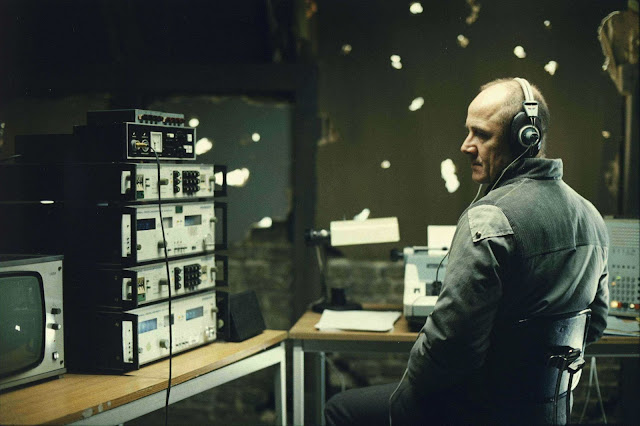After seeing Barbara
(2012) at the RBC Dumfries
I thought a revisit to another German film set around the same timespan would
not be out of order. Although I have seen The Lives of Others (2006) quite a
few times, twice at the cinema plus a couple of times on DVD I still find that
viewing this award winning movie a very emotional experience.
 |
| East German secret Police surveillance operation...... |
For those of you that have never seen this film, I doubt
that will be many, I will give you a short synopsis. The film opens with a
written statement informing us its 1984, we are in East Berlin and Glasnost is
nowhere in sight. The population of the German Democratic Republic is kept
under strict control by the East German Secret Police (the Stasi) Its force of
100000 employees and 200000 informers safeguard the Dictatorship of the
Proletariat. Its declared goal is to know everything. To this end Captain Gerd Wiesler (Ulrich
Muhe) a hard-line Stasi officer is engaged in the surveillance of an
author/playwright Georg Dreyman (Sebastian Koch) and his beautiful actress
girlfriend Christa-Maria Sieland (Martina
Gedeck) But unbeknown to Wiesler its not for political reasons that he has
been asked to spy on the loyal socialist Dreyman but more to do with removing
him on some jumped up charge so that the East German Culture Minister Bruno
Hempf can have the beautiful actress Christa-Maria all to him self. Wiesler is a sad and lonely man, with no
friends and no life outside of his work so when he begins to gather information
during the surveillance of the academic couple he realises that there is a life
beyond his bleak existence and he begins to form a bond with two people he does
not know. This in turn makes him question the morality of his job and politics.
 |
| ...........Dreyman and Christa-Maria have no idea whats happening in their loft area! |
The strength of this movie is in its powerful script written
by the film’s director Florian Henckel von Donnersmarck (The Tourist
2011) who carried out extensive research by interviewing both the people
that worked for the regime and those most effected by it. Machines and
equipment that were actually used by the Secret Police along with genuine
street locations, clothes and cars gave the film a great sense of authenticity.
A wonderfully convincing performance from the complete cast with Ulrich Muhe’s part
as Wiesler allegedly mirroring his own life! After German reunification he
discovered evidence in his Stasi file that he had been under surveillance not
only by four of his fellow actors but also by his wife who was registered as an
‘unofficial collaborator’ although she denied it. Muhe subsequently died of
stomach cancer in 2007. It was the
Lebanese composer Gabriel Yared, who won an Oscar for Best Original Score for The English Patient (1996), who composed
the haunting Sonata for a Good Man
that plays such a significant part in von Donnersmarck film. Incidentally
Sebastian Koch, who could not play the piano, practiced for four hours a day
for six weeks so that he could actually perform this music. This is an
intensely enjoyable piece of cinema that reveals the mechanism of dictatorship
by showing as clearly as possible human destinies from the perspective of a man
that worked for the secret police, unusually, for German film, depicting him as
a human-being rather than a clog in the state wheel.

No comments:
Post a Comment